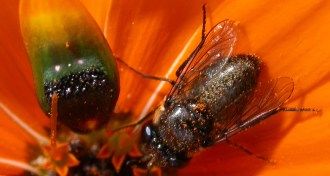Search Results for: mutations
Skip to resultsCan’t find what you’re looking for? Visit our FAQ page.
2,458 results for: mutations
-

-

-
 Plants
PlantsDastardly daisies
This flower isn’t just any old sex cheat. It can be sexually deceptive three ways and in 3-D.
By Susan Milius -

19870
This article reviews efforts to explain why certain biological molecules tend to be all right-handed (e.g., sugars) or left-handed (e.g., amino acids). An explanation might lie in the evolution of enzymes involved in their synthesis. For example, the fact that some organisms produce predominantly d-alanine could be explained by random mutations for the opposite enzyme […]
By Science News -
 Math
MathMöbius at Fermilab
Fermilab’s Wilson Hall. Courtesy of Fermilab. Soaring into the sky like a medieval cathedral, the twin towers of the structure known as Wilson Hall dominate the flat countryside surrounding the Fermi National Accelerator Laboratory (Fermilab) in Batavia, Ill. Named for physicist and accelerator builder Robert Rathbun Wilson (1914-2000), the building celebrates Wilson’s vision and skill, […]
-
 Math
MathPrime-Time Cicadas
Cicadas are flying, plant-eating insects. Most cicada species have life cycles that span 2 to 8 years. They spend most of their lives underground before emerging as adults. In a few species, almost all the individuals in a given location come out of hiding at the same time. These are known as periodical cicadas, and […]
-

Eat Smart
Your daily diet may have an impact on your brain's resiliency in the face of injury or disease.
-
 Health & Medicine
Health & MedicineNow Hear This
Genetics research, work with stem cells, and studies of the inner ear's delicate architecture suggest that it might be possible to restore cells pivotal to hearing.
-

Nurture Takes the Spotlight
What a person eats, what chemicals he or she is exposed to, and other features of a person's environment chemically modify chromosomes, thereby changing how genes are ultimately expressed.
-
 Health & Medicine
Health & MedicineA Vexing Enigma
While no drug or lab test is approved to treat or diagnose chronic fatigue syndrome, new research into the biology of the disorder may begin to shed light on the problem.
By Ben Harder -

Bringing Up Baby’s DNA
Researchers are developing ways to harvest babies' genes in less invasive ways.
-
 Health & Medicine
Health & MedicineThe Screen Team
New and experimental methods of screening for colorectal cancer that patients find less unpleasant than current tests could take a bite out of the malignancy's toll.
By Ben Harder